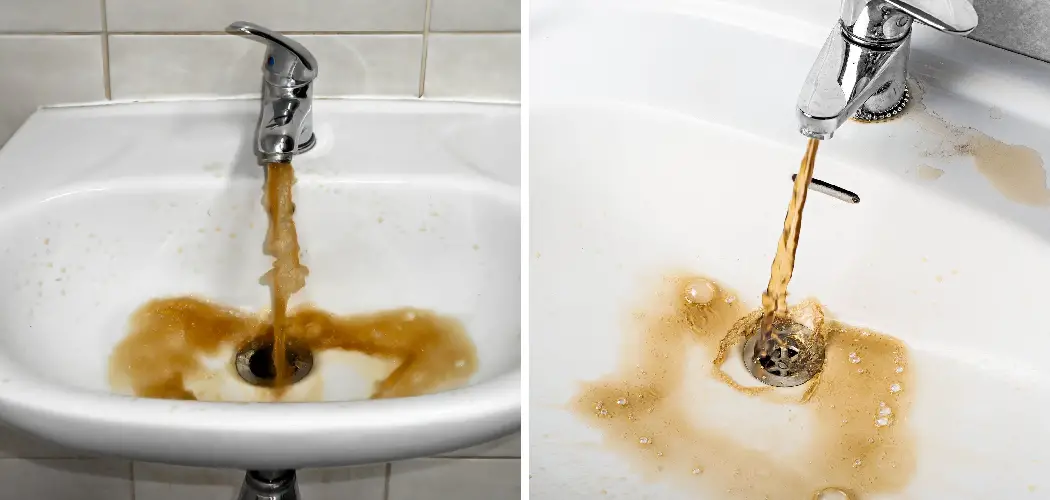Rust is a common problem that affects tap water, especially in older homes. It not only makes the water look unappealing but can also cause health concerns if consumed regularly.
Rust forms when iron-containing materials come into contact with oxygen and moisture for an extended period of time. While it may seem harmless, rust can contain harmful bacteria and heavy metals that can be dangerous to human health.
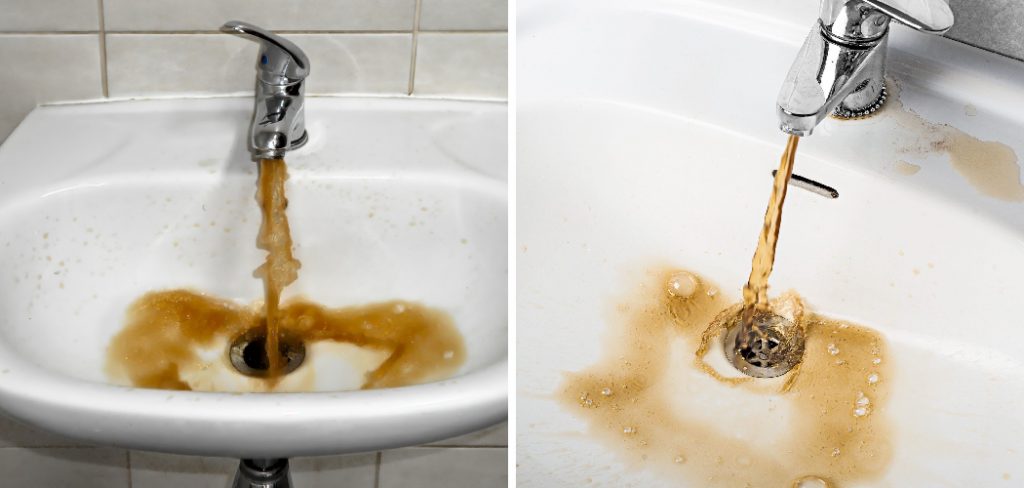
The main advantage of removing rust from tap water is to ensure clean and safe drinking water. By eliminating rust, you can prevent potential health hazards and improve the taste and appearance of your water.
Additionally, removing rust can also help prolong the lifespan of your plumbing fixtures and appliances by reducing their exposure to corrosive materials. In this blog post, You will learn in detail how to remove rust from tap water.
Step-by-step Instructions for How to Remove Rust From Tap Water
Step 1: Inspect Your Tap Water
Before taking any action, first, analyze the level of rust in your tap water. If it’s just a slight discoloration, simply flushing out the system may be enough. However, if there is an excessive amount of rust, you will need to take further steps.
Step 2: Boil the Water
The simplest way to remove rust from water is by boiling it. Boiling water kills any bacteria present and removes some of the iron oxide, reducing rust and improving the taste. You can find various rust removal agents in stores or make your own solution using vinegar or lemon juice. Apply the solution to the affected area and let it sit for a few minutes before rinsing with clean water.
Step 3: Install a Water Filter
A water filter can effectively remove rust particles and other impurities from tap water. There are various types of filters available, so be sure to choose one that specifically targets rust removal. Distilled water has gone through a process to remove impurities, including rust. Using distilled water for cooking and drinking can significantly reduce your exposure to rust.
Step 4: Install a Water Softener
Hard water with high levels of minerals can cause rust to form more easily. Installing a water softener can help prevent the buildup of these minerals, ultimately reducing the likelihood of rust in your tap water. Rust can accumulate in your plumbing fixtures over time, causing discoloration and affecting the taste of water. Regularly cleaning your fixtures can help prevent this buildup.
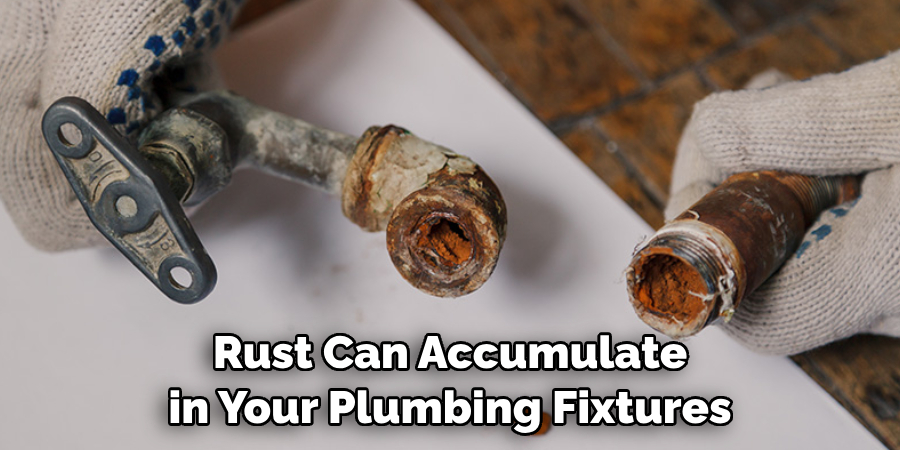
Step 5: Check for Leaks
Leaking pipes or faucets can introduce oxygen and moisture into the system, causing rust to form. Be sure to regularly check for leaks and repair them promptly. If your home has older pipes that are prone to rusting, consider replacing them with newer, more resistant materials such as PVC or copper.
If you have tried all the above methods and are still experiencing excessive rust in your tap water, it may be time to consult a professional plumber. They can assess the situation and offer expert advice on how to remove rust from your tap water.
Precautions for How to Remove Rust From Tap Water
- Always wear protective gloves and eye gear when handling rust removal agents.
- Be sure to properly dispose of any chemicals used in the process according to local regulations.
- Do not mix different types of cleaning solutions as it could result in a hazardous chemical reaction.
- Avoid using abrasive materials or tools that can damage your plumbing fixtures.
- If using a water softener or filter, be sure to properly maintain them according to the manufacturer’s instructions.
- Regularly test your tap water for impurities and make necessary adjustments.
- If you are unsure about any steps in the rust removal process, consult a professional to avoid causing further damage or health risks.
By following these precautions, you can ensure a safe and effective rust removal process for your tap water.
Are There Any Health Risks Associated With Drinking Rust Contaminated Water?
While drinking small amounts of rust-contaminated water may not immediately cause health issues, it is still important to address the problem as soon as possible. Consuming excessive amounts of rust can lead to various health risks, including stomach issues, nausea, and vomiting.
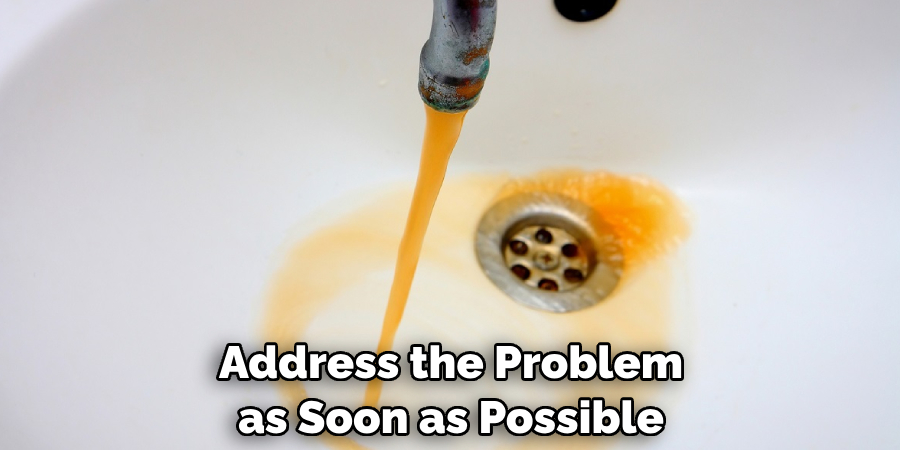
Additionally, rust can contain harmful bacteria such as E.coli and coliform which can cause more severe illnesses.
Furthermore, rust particles can also contain heavy metals like lead and copper, which are toxic to the human body when consumed in high levels. These metals can accumulate in the body over time and cause long-term health problems. To avoid these risks, it is essential to remove rust from tap water and ensure that you have a clean and safe drinking water supply.
So, be proactive and take the necessary steps to remove rust from your tap water for your health and safety. So, be proactive and take the necessary steps to remove rust from your tap water for your health and safety.
How Long Does It Take for Rust to Accumulate in Tap Water?
The time it takes for rust to accumulate in tap water can vary depending on several factors. These include the age and condition of your plumbing system, the level of iron or other minerals in your water source, and the presence of oxygen and moisture.
In some cases, rust can start forming within a few months in pipes made from materials that are prone to corrosion. However, it can take several years for significant amounts of rust to accumulate and affect the quality of tap water.
Regular maintenance and proactive steps such as installing a water softener or filter can help slow down the accumulation of rust in your tap water. It is essential to routinely monitor the condition of your plumbing system and address any issues promptly to prevent excessive rust buildup.
Overall, the exact time it takes for rust to accumulate in tap water can vary, but taking preventative measures can help prolong the lifespan of your plumbing system and ensure the safety of your drinking water. So, it’s essential to address any signs of rust in tap water as soon as possible.
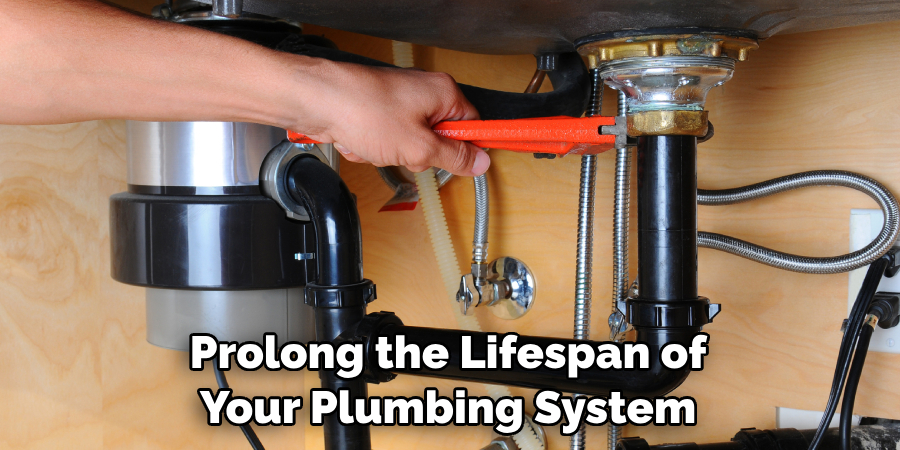
Is There a Way to Prevent Rust From Forming in Tap Water?
- Regularly clean and maintain your plumbing fixtures to prevent rust buildup.
- Monitor the pH level of your tap water and take necessary steps to balance it if needed.
- Install a water softener to reduce mineral deposits that can lead to rust formation.
- Regularly check for and repair any leaks in your plumbing system to prevent moisture from entering and causing rust.
- Use distilled or filtered water for drinking and cooking to minimize exposure to rust.
- Consider replacing old pipes with newer, more resistant materials.
- Use rust inhibitors in your plumbing system to slow down the formation of rust.
- Avoid using harsh or abrasive cleaning products on your fixtures that can damage them and lead to rusting.
- Install a whole-house filtration system to remove impurities, including rust, from your tap water.
- Regularly test your tap water for contaminants and take necessary measures to treat any issues found.
By following these steps, you can significantly reduce the chances of rust forming in your tap water and ensure a safe and clean water supply for your household.
Are There Different Methods for Removing Rust From Tap Water?
- Boiling Water: Bring tap water to a rolling boil for at least one minute to kill bacteria and remove some iron oxide.
- Chemical Solutions: Use rust removal agents such as vinegar or lemon juice by applying them directly to the affected area and letting them sit before rinsing with clean water.
- Water Filters: Install a water filter designed specifically for removing rust particles from tap water.
- Distilled Water: Use distilled water for drinking and cooking as it has gone through a process to remove impurities, including rust.
- Water Softeners: Install a water softener to prevent the buildup of minerals that can cause rust in tap water.
- Regular Cleaning: Routinely clean your plumbing fixtures to prevent rust buildup over time.
- Consult a Professional: If all else fails, consult a professional plumber to assess the situation and offer expert advice on how to remove rust from your tap water.

By using these methods, you can effectively remove rust from your tap water and improve its overall quality.
Are There Any Potential Long-term Effects of Consuming Rust-contaminated Tap Water?
- Regular consumption of rust-contaminated tap water can lead to an increased risk of health issues.
- Rust can contain harmful bacteria and heavy metals that can cause gastrointestinal problems, organ damage, and even certain types of cancer.
- Long-term exposure to these substances can have detrimental effects on the body.
- Ingesting rust-contaminated tap water over time can also aggravate pre-existing health conditions.
- The buildup of rust in the plumbing system can affect water pressure and result in costly repairs.
- Rusty tap water may have an unpleasant taste and odor, reducing its usability for cooking or drinking.
- If left untreated, rust can lead to corroded pipes and other plumbing fixtures, causing further damage and potential health risks.
- Regularly consuming rusty tap water can also impact the overall quality of life and well-being.
By taking proper measures to remove rust from tap water and prevent its accumulation, you can avoid these potential long-term effects and ensure safe and clean drinking water for yourself and your family.
Final Thoughts
Removing rust from tap water is essential for maintaining a safe and healthy home. By regularly inspecting, cleaning, and taking necessary precautions, you can prevent the formation of rust and improve the quality of your tap water. Additionally, consulting a professional plumber can provide valuable insights and solutions for removing rust from your tap water.
Remember, taking proactive steps to maintain your plumbing system and monitor the quality of your tap water is crucial for ensuring the well-being of yourself and your family.
So, don’t wait until it’s too late – start taking action now to remove rust from your tap water and ensure a clean and safe water supply for your household. I hope this article has been beneficial for learning how to remove rust from tap water. Make Sure the precautionary measures are followed chronologically.

